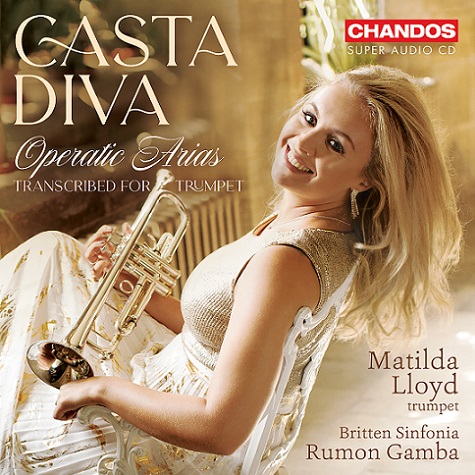

The emergence of a ‘Bel Canto’ singing style in the 1830s brought a new multi-faceted versatility to the operatic stage that was to flourish through the compositional gifts of the likes of Bellini, Donizetti and Rossini.
However, its gestured phrasing and syllabic emphasis was later overtaken by the less embroidered dramatic heft of the arias of Verdi, Puccini and Wagner. By 1858, Rossini was to remark that it was already ‘lost’, whilst Franz Sieber later longed for its return from ‘the most offensive shrieking of dramatic singing’ that had replaced it.
Later, singers such as Alfredo Kraus, Franco Corelli, Maria Callas and Marilyn Horne revived its popularity with their astounding technique and personalities, although today it has become a more refined, less ornate display of theatrical artistry that remains central to any operatic star’s performance armoury.
Elegance and refinement
On this outstanding release, Matilda Lloyd has certainly played her part in presenting five bel canto arias with a modern lyrical elegance and decorative refinement. Her starting point was Arban’s treatise on Bellini’s ‘Norma’ and the aria ‘Casta Diva’ that he so cleverly turned into a set of variations.
The playful exposition of the ‘Cavatina’ from Bellini’s ‘Beatrice di Tenda’ contrasts the yearning sadness Lloyd evokes as Juliet yearns for her absent lover in ‘Oh! Quante volte’ from his ‘I Capulet e I Montecchi’.
Before that statement rendition though, we are treated to both intimate expression and characterful virtuosity - from the joyful baritone aria ‘Liete voci!’ and ‘Ah si, questo di mia vita’ from Mercadante’s ‘Zaira’, to the tender soprano mercies of ‘Oh! Mie Fedeli…’
The playful exposition of the ‘Cavatina’ from Bellini’s ‘Beatrice di Tenda’ contrasts the yearning sadness Lloyd evokes as Juliet yearns for her absent lover in ‘Oh! Quante volte’ from his ‘I Capulet e I Montecchi’.
Delicate artistry
Ricci’s sparkling ‘tarantella’ has a zesty touch of comic cameo, whilst Rossini’s contralto aria, ‘Ah! Quell giorno ognor rammento’ from his final opera ‘Semiramide’ and his post-retirement ‘Prelude, theme et variations’ (original written for horn but performed by the soloist on flugel) are hallmark examples of a formula the composer rarely detoured from – both played with delicate artistry.
There is also a florid habanera sway to Viardot’s ‘Havanaise’ and tender sweetness to ‘Chanson de la pluie’ from ‘Le Dernier Sorcier’ - the droplets of light rain falling in the accompaniment to the liquid expression of the soloist.
There is also a florid habanera sway to Viardot’s ‘Havanaise’ and tender sweetness to ‘Chanson de la pluie’ from ‘Le Dernier Sorcier’ - the droplets of light rain falling in the accompaniment to the liquid expression of the soloist.
Nobility
The familiar tenor strains of Donizetti’s ‘Una furtiva lagrima’ from ‘L’elisir d’amore’ perhaps loses some of its red wine depth played on the Eb trumpet, but there is a mournful nobility (played on Bb trumpet) in the short ‘Prelude to Act II’ from ‘Don Pasquale’, followed by the charm and soprano capriciousness of ‘Quel guardo il cavaliere’ (Eb trumpet).
It brings to a close an intelligently considered release (especially the use of different instruments to maintain the connection to the original vocal timbre) aided greatly by the lithe, understated playing of the Britten Sinfonia under Rumon Gamba’s sympathetic lead and high class production values led by William Foster’s cultured arrangements.
Iwan Fox
To purchase: https://www.matildalloyd.com/casta-diva
Play list:
1. Liete voci! from 'Zaira' (Saverio Mercadante -1831)
2. Ah sì, questo di mia vita from 'Zaira' (Saverio Mercadante -1831)
3. Oh! mie Fedeli… Ma la sola, ohimè son io from ‘Beatrice di Tenda’ (Vincenzo Bellini -1833)
4. Variations on a Cavatina from Bellini's 'Beatrice di Tenda' (Jaen Baptiste Arban c.1864)
5. Oh! quante volte from ‘I Capuleti e I Montecchi’ (Vincenzo Bellini - 1830)
6. Variations on Bellini’s ‘Norma’ (Casta Diva) (Jean Baptiste c.1864)
7. Tarantella Napoletana from ‘La festa di Piedigrotta’ (Luigi Ricci - 1852)
8. Ah! quel giorno ognor rammento from ‘Semiramide’ (Gioachino Rossini - 1823)
9. Havanaise, VWV 1019 (Pauline Viardot c. 1880)
10. Chanson de la pluie from ‘Le Dernier Sorcier’ (Pauline Viardot - 1867)
11. Prélude, thème et variations (Gioachino Rossini - 1857)
12. Una furtiva lagrima from 'L'elisir d’amoure’ (Gaetano Donizetti - 1832)
13. Prelude to Act II from ‘Don Pasquale’ (Gaetano Donizetti - 1843)
14. Quel guardo il cavaliere from ‘'Don Pasquale’ (Gaetano Donizetti - 1843)









